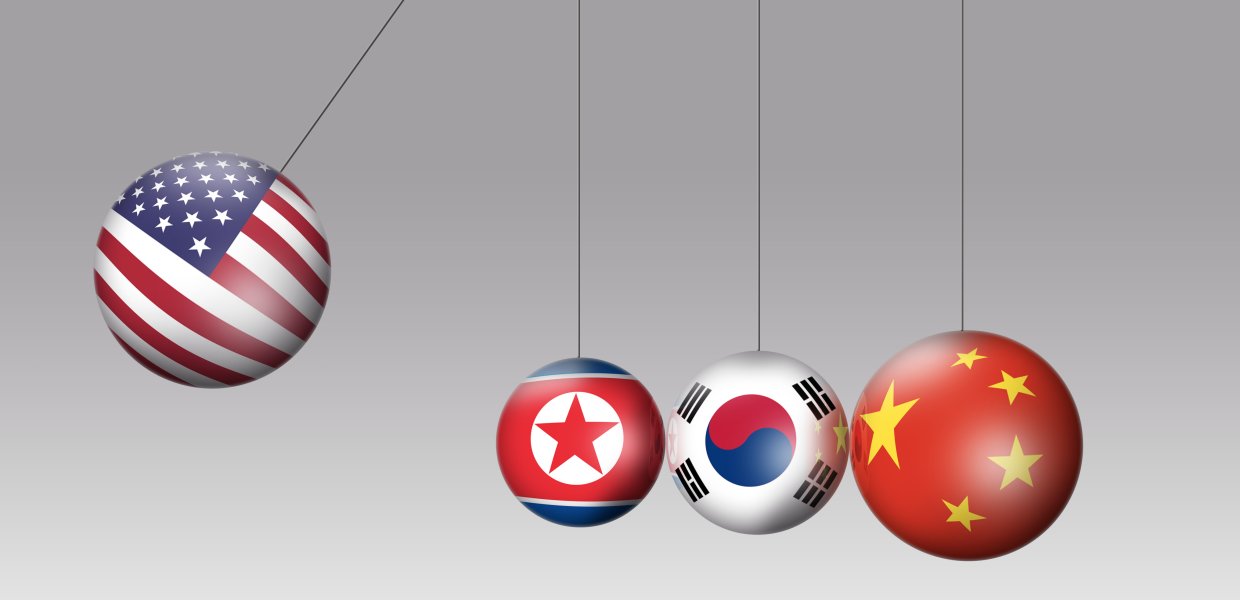Clayton Dube addresses U.S.-North Korea relationship with an eye toward China’s involvement
Clayton Dube first visited China in 1982, thinking he would be there merely a month. Yet, somehow, that month turned into a semester, and that semester turned into three years. Flashing forward to today, Dube, who directs the USC U.S.-China Institute, researches and analyzes the relationship between China and the United States.
At the institute, he has focused in part on how the relationship between the United States and China has affected other countries, specifically North Korea. In an interview, Dube spoke about how their relationship plays a role in the nuclear threat presented by North Korea, how President Donald Trump’s new presence in this conflict has affected the relationships between the three countries and how China’s mutual assistance agreement with North Korea’s affects the conflict.

It’s important for Americans to understand that the Chinese consider the existence of North Korea as part of their revolutionary heritage. They helped to defend North Korea in the Korean War and so they’re not easily able to walk away.
The situation with North Korea has gotten really bad, and because North Korea has built these bombs, built these missiles and is in the process of figuring out how to put the two together, they are destabilizing the region, and this instability is not good for China.
The result is South Korea has gotten closer to America, Japan has gotten closer to America, and both have gotten further from China, in diplomatic terms. There are some Chinese academics who are saying “we need to be prepared for a time when there’s no North Korea.”
With the ongoing change in Chinese government and the threat of nuclear weapons, do you think China will honor and defend the mutual assistance treaty?
China and North Korea have a defense agreement, so technically if North Korea is attacked, China is supposed to come to its assistance. The Chinese would like to drop that agreement, but to drop it, both sides have to agree.
It’s not going to be an easy thing to solve. The Chinese have some leverage in the sense that the North Korean economy very much depends on China, but China recognizes that there are limits to what it can do. For example, if they cut off oil, well, who does that really hurt — ordinary people or the government? How does it actually punish the people who are making the decisions? The reality is that it may not.
How do you think the nuclear threat will play out?
I think we are going to have to learn to live with a nuclear North Korea. We’re going to have to say, “Yes, you have nuclear weapons. If you ever take them outside to play, we will attack. If you use these weapons against anyone, we will attack with all of the capacity we have.”
The Korean War is technically still not over. There’s no peace treaty between North Korea and South Korea. Since 1953, the war has just been on pause. It is the threat of awful retribution from the United States that has kept North Korea from attacking the South.
South Korea used to be poor. Now it’s rich. It’s got a large army; it’s got a lot of power of its own. There’s no reason to think that having a nuclear weapon would change the basic dynamic, but what North Korea believes, it seems, is that having a nuclear weapon means they won’t be attacked themselves. It’s a sense of defense — it’s a deterrent.
At the United Nations General Assembly Trump said, “We will have no choice but to totally destroy North Korea.” How do you anticipate this playing out?
Well right now Kim Jong Un and the President Trump are exchanging insults and they’re becoming very personal. That’s not especially helpful. In fact, this is North Korea’s dream — to be so far under the skin of the American leader that you lose your cool and use language that’s not diplomatic.
The better thing is to speak in a far more measured tone but with the same message. The main problem with incendiary language is it makes the allies nervous — it makes South Korea nervous, and it may even make Japan a little nervous. It doesn’t help with China, which explicitly says, “Stop behaving like children. Stop, these comments — they are not helping.”
China is nervous because war on the Korean peninsula could quite quickly spill over throughout Northeast Asia and so while that would be a terrible thing for the Koreans, it would also be bad for the Chinese and for the Japanese, as well.
North Korea is hoping that Americans will split with South Korea and say they won’t defend them if it means putting their own country at risk of attack from North Korea.
North Korea can then put South Korea in a position where they have two choices: either join North Korea or be destroyed. The reality is that’s an oversimplification. The South Korean army is bigger than the North but nuclear weapons are incredibly destructive.
What role does Trump and Xi Jinping’s relationship play in this issue?
It’s also important to know that Xi Jinping and his government have a lot of experience in foreign affairs. Donald Trump and his group do not. There’s a danger in Trump accepting some kind of quick deal because it’s a deal that moves some things forward a little bit but has heavy long-term costs.
The Chinese play a very long-term game. They’re thinking over a 20-year horizon and the Trump administration may be thinking about what’s going to help it over a very short term. It’s especially true now because of Donald Trump’s relative inexperience and his kind of transactional nature. He likes to make deals; he likes to do something and then announce it.
The Chinese don’t operate in the same way and they can use this as an opportunity. If they think Trump is hungry for a deal, they can find some deal to give him that doesn’t really help the United States but will benefit China.
In Trump’s campaign, he said, “China has all kinds of power. They can stop North Korea tomorrow. They just need to be told to do it.” Well, after he became president, he learned that he can’t do that. He seems to accept that it’s not as simple as he thought. Right now, it seems he’s still hoping for Chinese help. He recently congratulated China on taking some banking measures that would limit North Korea’s capacity to move money around — things like that.
What do you believe is the next step forward in dealing with the nuclear threat from North Korea?
There’s another potential problem with North Korea. North Korea might share this technology with others in the same way it got the technology from Pakistan — which in turn got it from China. We need to limit North Korea’s ability to share this technology or sell this technology to somebody else, because North Korea will sell this technology to somebody who has a lot of money. North Korea needs money, and they wouldn’t necessarily be worried about how it would be used. North Korea, in fact, used to train terrorists. They have the advantage of being a state. The advantage is that you have certain resources — an army — and for the most part, you get to do what you want within your borders.
We have the ability to both deter North Korea from using these weapons and to contain their spread. That’s what we need to focus on.
Clayton Dube is interviewed by CNN regarding issues in North Korea.





